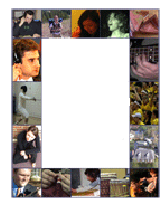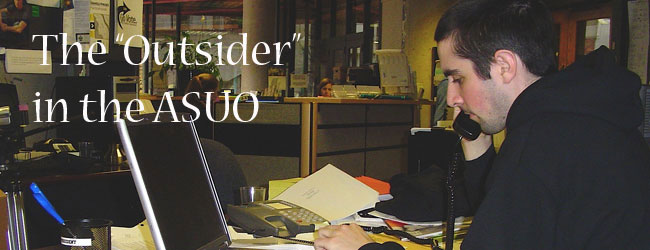
Sports
- The Outdoor Program helps people plan adventures.
- Adam Lake uses fencing to bring people together.
- Win or lose, the Pit Crew keeps Mac Court shaking for the Ducks.
- Tearing at jerseys and slamming into each other. It's women's rugby.
Changes
- A Taiwanese student finds adjusting to a foreign culture challenging.
- A close-up look at the ASUO president.
- A senior's abrupt transition to Eugene after Hurricane Katrina.
Arts
- A ballroom dance club president wears many hats and makes them too.
- Whether composing or jamming on his mandolin, Jesse Jones shares his love of music.
- Non-traditional African dance brings a new sense of community.
- The Student Fibers Guild proves that knitting isn't just for old ladies anymore.
- Halo Jones' music and art expresses his dark and light sides.
- A musician, student, activist and artist.
- For Ashley Maury, jewelry is more than decorative.
- A student TV show features news, sports, drama and comedy.
- A printmaking student goes beyond the studio and into the city.

A close-up look at the president of the ASUO
By Kit Myers
His scruffy beard, hooded sweatshirt and ball cap didn’t fit the archetype of a politician. He was supposed to be the underdog, and he and his running mate were the “outsiders.” They barely beat out second place by 22 votes and garnered fewer than half the votes the frontrunners did in the primary election for the Associated Students of the University of Oregon president and vice president positions.
That didn’t matter. Adam Walsh, 23, and his running mate, Kyla Coy, gained more than 700 votes from the primaries to the generals and beat their challengers by more than 300 votes. Final count: 1,174-857. At the time he was surprised by the final outcome in the general election, but reflecting on it now he says it makes more sense.
“I was surprised. Looking back on it, I feel like I should have been less surprised,” says Walsh. “I thought it would be close and that we’d lose, but we ended up winning by 300 votes.”
|
Walsh thinks one reason he and Coy won was because students were uneasy about another year with “insiders” from the ASUO running the office again.

Adam Walsh, president of the Associated Students of the University of Oregon. |
“Any other year we probably wouldn’t have stood as good as chance, but given the events of the year, our status as the outsiders kind of pushed us into a position where we had a more feasible chance of winning,” says Walsh.
As much as Walsh was unfamiliar with ASUO politics, he has had a history of dabbling with student government, organizations, and even a run at the Eugene City Council. The first office he held was in fifth grade as the school president for one semester. Since then, Walsh was involved in high school student government his junior and senior year at Marist Catholic High School in Eugene. Upon entering college Walsh, majoring in history and political science, decided that he needed to take a step back from student government and student involvement to explore other aspects of college and life. He says that he started watching city politics on the local access network and became frustrated. He says the council members weren’t listening to the citizens’ concerns. In his sophomore year he decided to run for city council. He says he didn’t really know what he was doing and that it was a learning experience.
“I think to a certain extent, and maybe even a large extent, my initial decision to run and my ensuing campaign was a bit naive,” says Walsh. “I don’t think I knew exactly what I was getting into when I filed my paper work for it.”
Walsh says he quickly learned that he needed to develop a platform so that he could start campaigning. He says he spent a few hours every day after school knocking on doors and spreading his message. He was also invited to neighborhood meetings with opposing candidates and would take turns answering questions.

Walsh received 10.8 percent of the votes in the 2004 primary election for Eugene City Council. |
“It was almost like I was kind of running by the seat of my pants,” says Walsh.
He says he received split reactions from voters on a consistent basis during his campaign. Some people, he says, wrote him off early because of his age and inexperience, while others were really excited to see a young person interested in politics.
“I think with some people it really struck a chord,” says Walsh. “‘Yeah, we need more young people in politics’ is what I heard a lot. ‘Yeah, this is great. This is cool.’”
Walsh says in the end the incumbent won by a large margin, but he nearly got 11 percent of the votes by knocking on doors and speaking at neighborhood associations.
Although he lost, he says his city council campaign gave him a lot of experience, and much of what he learned there played into his success at the ASUO. He says he was able to formulate a platform that was reasonable and realistic and learned how to communicate his message clearly.
“People want to promise everybody the world, and they want to promise people things that aren’t even inside of their purview or their power,” says Walsh. “…. The things that we talked about were real potential victories, and that realism was something that people could buy into.”
Walsh says he was inexperienced in the ASUO but that it wasn’t necessarily a bad thing because it allowed him and Coy to come in with a critical eye.
“By not having been in the ASUO before that was extra work that we had to adapt to, but at the same time, coming from the outside we questioned things a lot more and made sure that we felt comfortable,” says Walsh.
More than eight months later, Walsh says his first goal, creating rollover meal points in the residence halls, is accomplished. He is in the midst of his second point of his platform, which is slowing the growth of the incidental fee, and is beginning to look at the final issue, connecting the University with the community.

Next Page